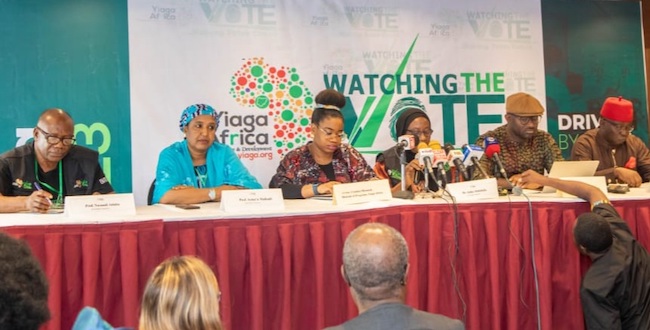Yiaga Africa, a civil society organization, says INEC flagrantly disregarded its regulations and guidelines by delaying the upload of the presidential and National Assembly elections held on 25 February.
It said the delay in uploading the results on its portal cast doubt on the credibility of the results of the elections.
The Executive Director of the foremost election observer, Yiaga Africa, Samson Itodo said about 200 million ballot papers were wasted in the just concluded elections because a lot of people did not show up to cast their votes.
Itodo stated this on Channels Television’s The 2023 Verdict on Wednesday.
“Yiaga Africa expressed concerns about the delay in uploading polling unit results for the presidential election on the INEC Election Results Viewing Portal (IReV).
“Undoubtedly, the delay in uploading the polling unit-level results cast doubts on the credibility of the results management process resulting in broken public trust in electoral technology.
“Yiaga Africa notes that the delayed upload of the results on the IReV is a flagrant disregard of INEC’s Regulations and Guidelines, and it failed to meet citizens’ expectations,” the report said.
“If 72 million ballot papers were issued to these accredited voters. We have about 200 million sheet of papers that have gone to waste. And if you check how much was expended per voter in this election, it was somewhere around six to eight dollars per voter.
“If you multiply that you discover that we have wasted billions of naira because people didn’t show up to cast their votes. And so that is money that could have been used to provide drugs to our primary healthcare centres,” Itodo said.
The group also recommended legal timelines for testing new electoral technologies in Nigeria’s electoral legal framework.
According to the group, the testing timeline will equip the commission to use its adopted technology effectively during the election.
It said that for the 25 February presidential election, it employed the Parallel Vote Tabulation (PVT) methodology.
The CSO said that it deployed 3,014 observers in pairs to a representative random sample of 1,507 polling units, 822 mobile observers in all 774 local government areas (LGAs), 36 states and the FCT.
“This deployment strategy enabled Yiaga Africa to provide timely and accurate information on the election day process commencing from the set-up, voter accreditation, voting, counting and to independently assess the official results of the presidential election as announced by INEC.
“This statement is based on reports from 1,454 to 1,507 (97 per cent ) sampled polling units in Nigeria.
“The PVT statistical analysis was based on the number of registered voters and not on the number of PVCs collected.”
The Independent National Electoral Commission (INEC) conducted presidential and National Assembly elections across the country on Saturday.
The number of registered voters was 93,469,008. The total of collected permanent voter cards was 87.2 million against 176,606 polling units. However, according to INEC, 25,286,616 voters were accredited.
At the end of the polls on Saturday, Bola Tinubu of the All Progressives Congress (APC) was declared winner of the presidential election by the Chairman of INEC, Mahmood Yakubu, on Wednesday.
According to INEC, Tinubu was victorious in 12 of Nigeria’s 36 states, and secured significant numbers in several other states to claim the highest number of votes — 8,794,726, almost two million votes more than his closest rival, former Vice President Atiku Abubakar of the Peoples Democratic Party (PDP).
Contesting for the sixth time, Atiku got 6,984,520 votes, while the candidate of the Labour Party (LP), Peter Obi, finished the race with 6,101,533.
Tinubu, a former Governor of Lagos State, received his certificate of return from INEC on Wednesday afternoon, alongside his running mate Kashim Shettima.


